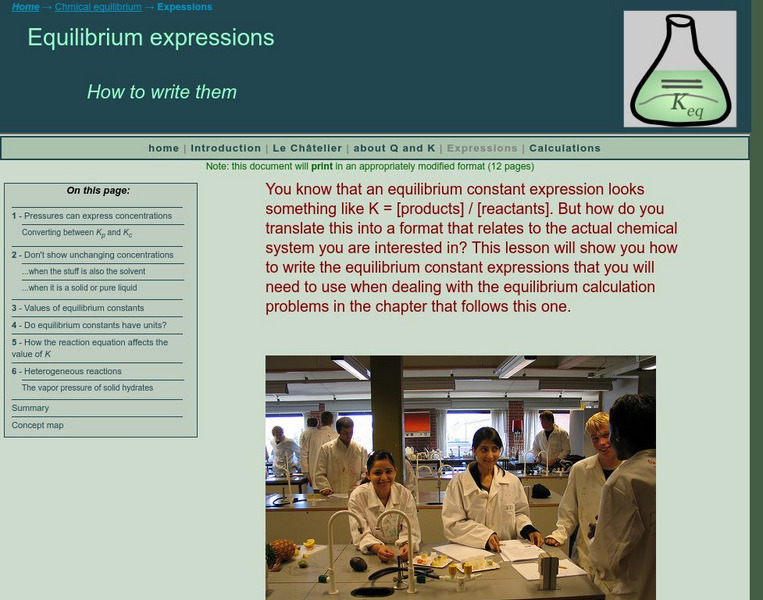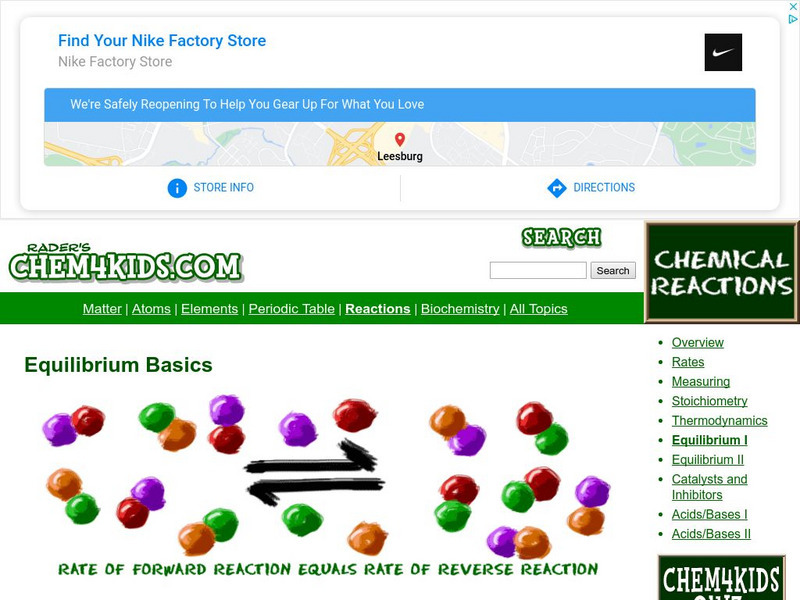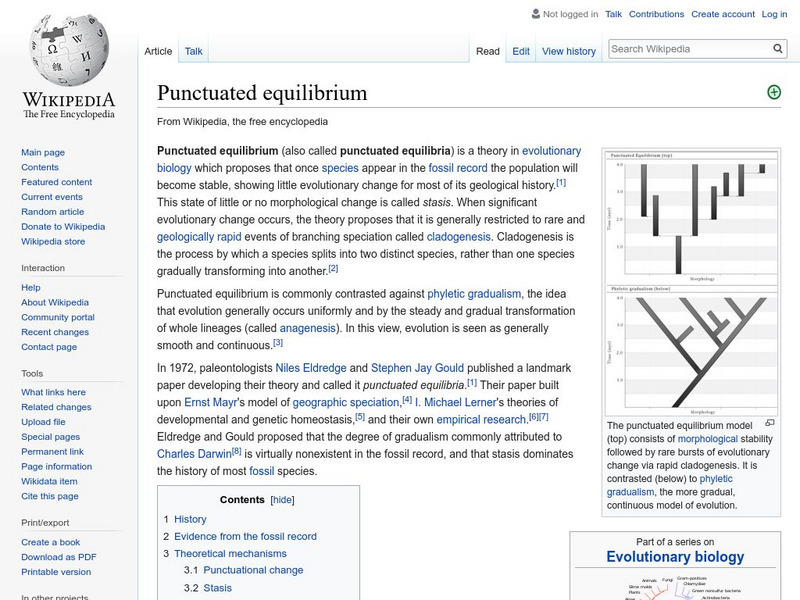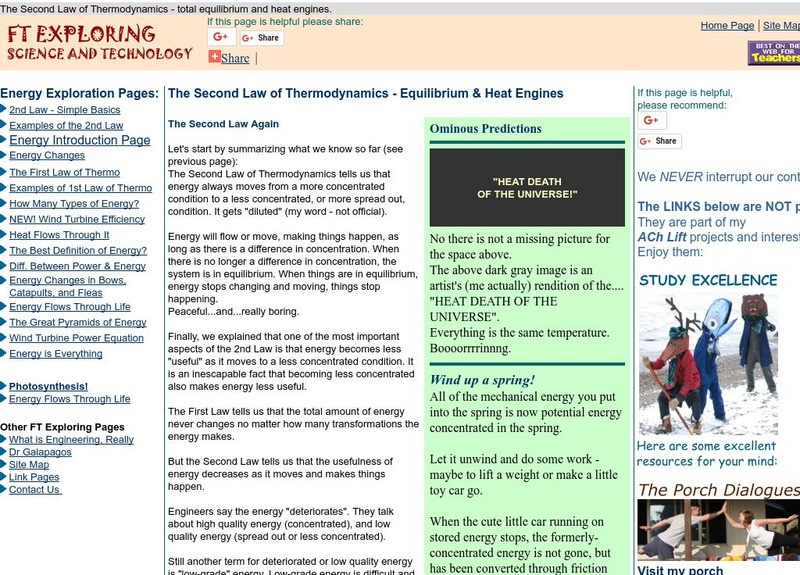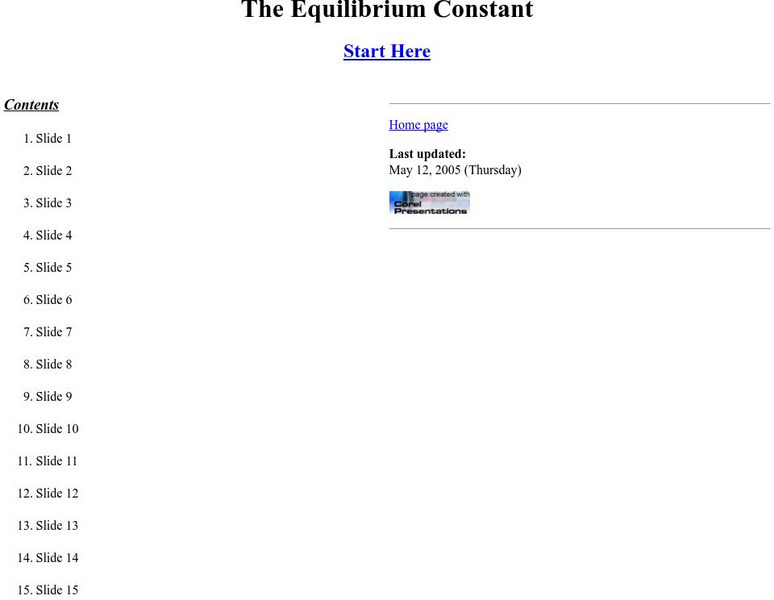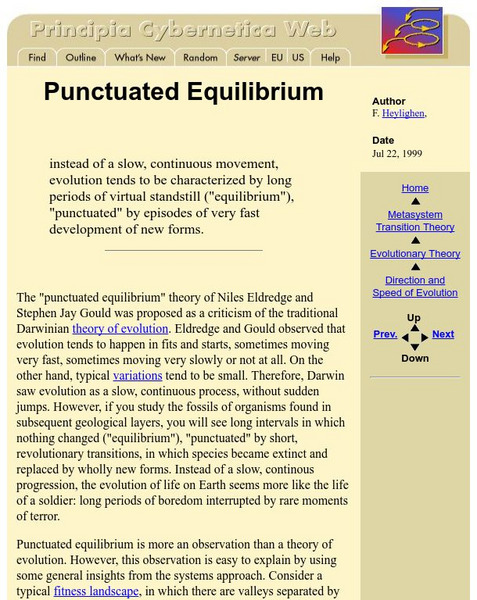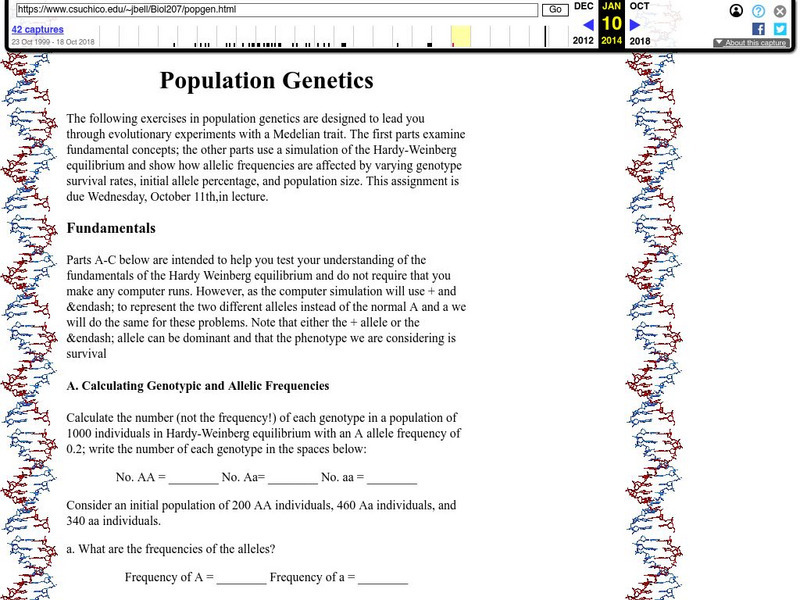National Institute of Open Schooling
Chemical Equilibrium
Le Chatelier's interest in thermodynamics and building materials such as cement and plaster led to the Le Chatelier Principle in 1884. Activity 13 in a series of 36 extensively explores chemical equilibrium. Learners read about...
National Institute of Open Schooling
Ionic Equilibrium
Scientific studies show the older we get, the more acidic we become. The activity extensively teaches high schoolers about acids and bases. By the end of the 14th installment of 36, they can define and explain three concepts of...
National Institute of Open Schooling
Spontaneity of Chemical Reactions
Do spontaneous reactions really occur? Activity 12 in a series of 36 focuses on spontaneity of chemical reactions. Learners read about, discuss, and answer questions pertaining to entropy, explain the third law of thermodynamics, explore...
Khan Academy
Khan Academy: The Equilibrium Constant K
Reversible reactions, equilibrium, and the equilibrium constant K. Learn how to calculate K, and how to use K to determine if a reaction strongly favors products or reactants at equilibrium.
Khan Academy
Khan Academy: Calculating Equilibrium Constant Kp Using Partial Pressures
A thorough reference providing the definition of equilibrium constant Kp for gas phase reactions, and how to calculate Kp from Kc.
Other
New Mexico State University: Chemical Equilibrium
A one page tutorial which teaches the viewer how to predict and write equilibrium expressions and use them to calculate equilibrium concentrations. Discusses Le Chatelier's Principle.
Science Struck
Science Struck: Calculation of Static Equilibrium: Case Studies
Explains the concept of equilibrium and what static equilibrium is, gives some examples, and models how to calculate static equilibrium through some problems with detailed solutions.
Simon Fraser University
Chem1 Virtual Textbook: What Is Equilibrium?
Acting as an overview from the General Chemistry Virtual Textbook, this site sets down a definition of equilibrium and defines several types including mechanical equilibrium, thermal equilibrium, and chemical equilibrium.
Shodor Education Foundation
Shodor: Equilibrium
A presentation of the basics of chemical equilibrium, covering equilibrium expressions, Le Chatelier's principle, and sample calculations.
Simon Fraser University
Chem1 Virtual Textbook: How to Write Equilibrium Expressions
Acting as an overview from the General Chemistry Virtual Textbook, this site explores a range of topics related to equilibrium expressions including concentrations and pressures in equilibrium expressions, unchanging concentrations,...
Simon Fraser University
Chem1 Virtual Textbook: All About Chemical Equilibrium
Acting as an overview from the General Chemistry Virtual Textbook, this site explores a range of topics related to chemical equilibrium including chemical change, the Le Chatelier principle, the equilibrium quotient, and more.
Other
Amos Web Gloss Arama: Market Equilibrium
This economic glossary site gives a basic definition of market equilibrium.
Wikimedia
Wikipedia: Mechanical Equilibrium
Wikipedia provides information on mechanical equilibrium, the state of a mechanical system in which the sum of the forces on each particle of the system is zero.
Chem4kids
Chem4 Kids: Equilibrium Basics
This Chem4Kids.com site explains what equilibrium is in easy-to-understand language. Content includes a great example, as well as exploring different things which effect the position of equilibrium.
Wikimedia
Wikipedia: Punctuated Equilibrium
This brief explanation of punctuated equilibrium includes paragraphs on the history of the theory and the controversy surrounding it.
FT Exploring
Ft Exploring: The Second Law of Thermodynamics Equilibrium & Heat Engines
Use this illustrated guide to understand equilibrium and heat engines as they relate to the second law of thermodynamics.
Simon Fraser University
Chem1 Virtual Textbook: Effects of Dilution on an Equilibrium
Acting as an overview from the General Chemistry Virtual Textbook, this site explores equilibrium and equilibrium constants in reference to dilution. Formulas and charts are also provided on the subject.
University of Hamburg
University of Hamburg: The Hardy Weinberg Equilibrium
Discusses the historical background leadingto the development of the Hardy-Weinberg principleand the assumptions of the principle. Providesmathematical and graphical illustrations ofthis principle.
Upper Canada District School Board
Tom Stretton's Chemistry Pages: The Equilibrium Constant
This illustrated slideshow presents the chemistry concept equilibrium constant in a chemical reaction.
Other
Principia Cybernetica Web: Punctuated Equilibrium
Starts with a definition of Punctuated Equilibrium, followed by an explanation of this "Observation," and how it fits with other evolutionary theory.
Simon Fraser University
Chem1 Virtual Textbook: Energetics of Chemical Change
Energetics of chemical change is a section of a larger overview on Chemistry, which covers a variety of aspects. This section focuses on energetics and equilibrium, and chemical energetics. Examples, formulas, and pictures are provided.
Other
Sustainable Scale: Ecosystem Functions and Services
Authors make a case for the delicate state of equilibrium of an ecosystem. Also describes the important functions and services of ecosystems.
California State University
Csu Chico: Population Genetics
This is a group of Mendelian Genetics exercises that are designed to show the evolution of a trait within a population. The site covers instruction in calculating genotypic and allelic frequencies, determining dominance, the...
Ohio University
Haptic Augmented Simple Machines: The Lever
An explanation of the three types of levers, with examples of each. The formula for the law of equilibrium is also demonstrated.
Other popular searches
- Dynamic Equilibrium
- Chemical Equilibrium
- Hardy Weinberg Equilibrium
- Thermal Equilibrium
- Market Equilibrium
- Punctuated Equilibrium
- Equilibrium Prices
- Genetic Equilibrium
- Equilibrium Constants
- Prue Calculus Equilibrium
- Equilibrium Quantities
- Price Equilibrium








